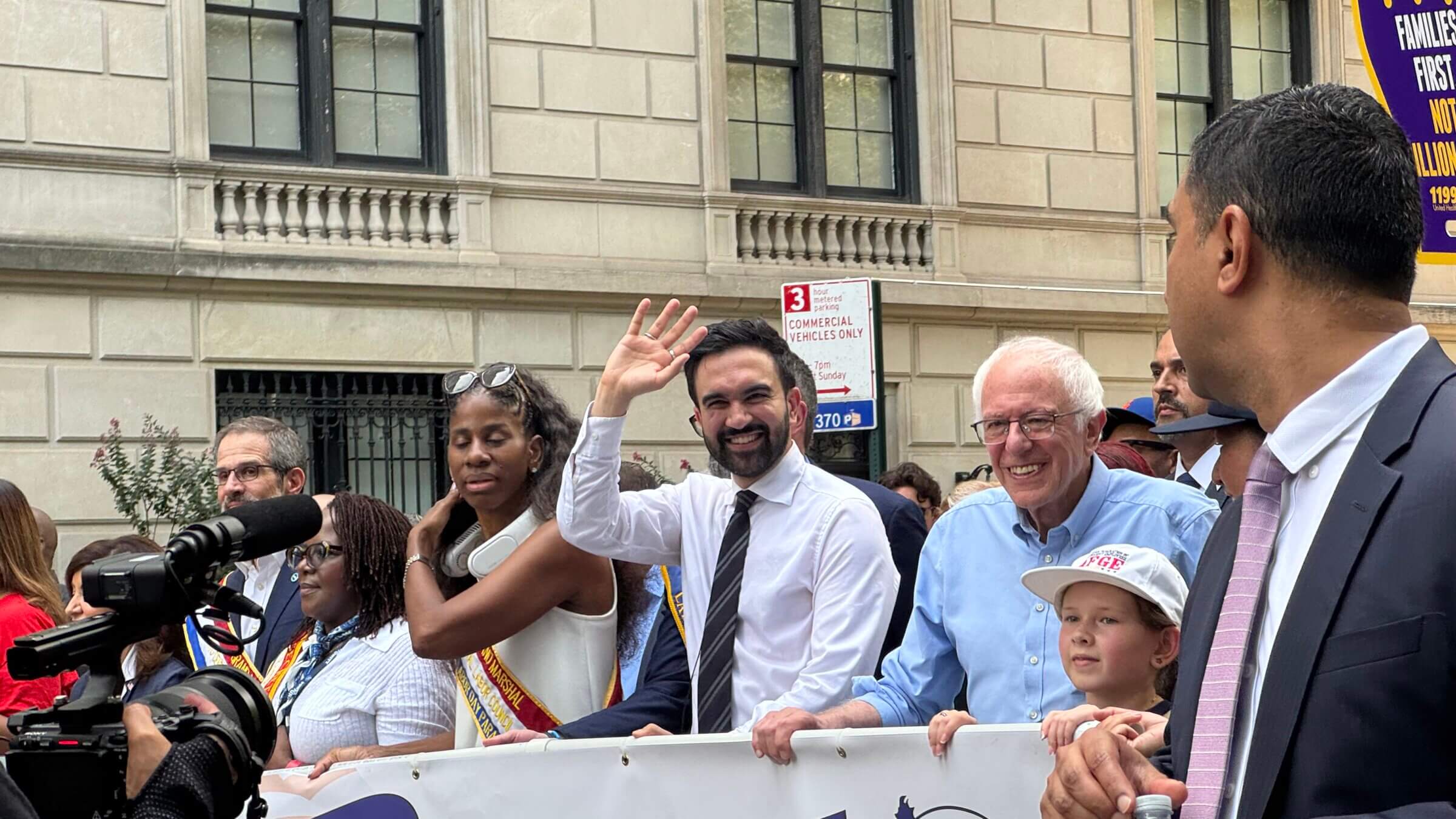‘The future of the Democratic party’: Mamdani joins Sanders to ‘fight oligarchy’
Mamdani credited the Jewish senator from Vermont for inspiring his political career

Zohran Mamdani and Bernie Sanders march together at the 2025 NYC Labor Day Parade. Photo by Hannah Feuer
Bernie Sanders and Zohran Mamdani are joining forces.
The 83-year-old independent Jewish senator from Vermont and the 33-year-old Democratic nominee for New York City mayor, who is a Muslim — both self-described democratic socialists — spent the weekend rallying supporters side by side.
Sanders, like Mamdani, is a strident critic of how Israel has conducted the Gaza war. He is also the first Jewish presidential candidate to win major party nominating contests and has become an icon of the Jewish left. Their weekend bro-show could lend Mamdani some cover in an election season in which his rivals and some in the Jewish community have accused him of coddling antisemites.
On Saturday, Mamdani appeared with Sanders on the senator’s national “Fighting Oligarchy” tour at a Brooklyn town hall, where Mamdani led the crowd in a rendition of “Happy Birthday” for the soon-to-be 84-year-old senator. That morning, the two marched together in New York City’s Labor Day Parade, waving to crowds cheering “Bernie! Bernie!” and posing with union leaders. The night before, they shared a meal at an Indian restaurant in Manhattan.
“It was [Sanders’] campaign for the presidency in 2016 that gave me the language of democratic socialism to describe my politics,” Mamdani said at Saturday’s stop, calling Sanders “an icon of our struggle.” Mamdani has previously called Sanders “the single most influential political figure in my life.”
At Saturday’s town hall, Sanders returned the favor, calling Mamdani “the future of the Democratic Party” and praising his grassroots campaign.
Since February, Sanders has been crisscrossing the country on his “Fighting Oligarchy” tour, drawing crowds in the tens of thousands and often using the stage to spotlight another young democratic socialist, Rep. Alexandria Ocasio-Cortez.
After Mamdani’s victory in the mayoral primary in June, the two met in Washington, D.C., where Sanders reportedly urged Mamdani to be cautious about how he approaches talking about Israel and not to minimize Jews’ fears of antisemitism. Sanders spent time in Israel as a young man and has in past campaigns pushed back against anti-Israel invective from the left. Mamdani, a state assemblyman, got his start in activism in pro-Palestinian advocacy.
‘An electrifying feeling’
At the town hall, Sanders and Mamdani talked about income inequality, resistance to the Trump administration, campaign finance reform, and the push for universal healthcare and childcare, among other progressive priorities.
Palestinian activism came up early in the program. Mamdani began the event by acknowledging PSC-CUNY, the main labor union for faculty at the City University of New York, where four professors say they were fired for their pro-Palestinian activism.
“No faculty member should be fired for supporting Palestinian rights,” Mamdani told the crowd, prompting chants of “Free, free Palestine!”
During the Q&A portion, an audience member who identified themselves as a Jewish student at Brooklyn College, also brought up the faculty members’ firing.
“The point that’s being raised is that we are seeing faculty members who are facing not just discipline, but termination for the crime of expressing solidarity with the fight for Palestinian human rights,” Mamdani responded.
Mamdani also spoke about how Sanders provided inspiration for his political campaign, noting that his very first canvassing effort for his State Assembly run in 2019 took place outside a Sanders rally.
“We walked inside this rally, and I remembered an electrifying feeling,” Mamdani said Saturday. “When Bernie walked out…we felt as if possibility was a fact of life.”
From Brooklyn Jew to presidential hopeful
The tour stop Saturday inside a Brooklyn College auditorium was a homecoming for Sanders, who was raised in a working class Jewish family in Brooklyn and attended Brooklyn College for a year before transferring to the University of Chicago.
Sanders, whose father was a Polish-Jewish immigrant, attended Hebrew School growing up and was bar mitzvahed at the historic Kingsway Jewish Center in Brooklyn. He spent several months of his early 20s living on the Israeli kibbutz Shaar Ha’amakim.
He got his start in politics while still in college, as a protest organizer during the civil rights movement. At 21 years old in 1963, he was arrested at a protest against school segregation in Chicago.
In 1968, Sanders moved to Vermont’s rural Northeast Kingdom, and in 1981, was elected mayor of Burlington as an independent and self-described socialist. His slogan then was “Burlington is not for sale.”
“One of the many things that we love about Bernie is you could go to any year in politics, and you’ll find him saying the same thing,” Mamdani said at Saturday’s town hall.
As mayor of Burlington, Sanders allowed a public menorah to be placed at city hall, a move that was contested in court and played a role in a 1989 Supreme Court case allowing menorahs to be displayed on public property.
Sanders ran for president in both 2016 and 2020, fueling hopes among supporters he could become the first Jewish president. While he didn’t win the Democratic nomination, he is credited with pushing the Democratic party to the left — and was in 2016 the first Jewish American to win a state presidential primary.
While Sanders does not often speak about his religious beliefs, he has spoken about how his family history impacts his politics.
“I am very proud of being Jewish, and that is an essential part of who I am as a human being,” he said during a presidential debate in 2016. “Look, my father’s family was wiped out by Hitler in the Holocaust. I know about what crazy and radical and extremist politics mean.”
Sanders is not the only high profile Jewish politician to endorse Mamdani. In the run-up to the mayoral primary, Mamdani and the Jewish city comptroller Brad Lander cross-endorsed each other, and many of Mamdani’s closest advisors are Jewish.
Jews for Racial and Economic Justice and Jewish Voice for Peace have teamed up to campaign for Mamdani under the umbrella “Jews for Zohran,” appearing at rallies with signs like “unLOX the funding” and “down with Cuomo Capers.”
Anna Eisen, a 20-year-old supporter at the “Fighting Oligarchy” stop Saturday in Brooklyn, said Mamdani’s message of affordability resonates with her as a young voter. As a Jew, she said she appreciated how Mamdani has promised to increase funding for hate crime prevention.
“I think he’s just gonna make life better for all New Yorkers, regardless of their background,” Eisen said.
What are Sanders and Mamdani’s positions on Israel and Gaza?
Mamdani has been a longtime critic of Israel and supporter of the Boycott, Divestment, and Sanctions (BDS) movement, going back to his days as co-founder of a Students for Justice in Palestine chapter at Bowdoin College. He has said that, if elected mayor, he would dissolve a council aimed at strengthening the U.S.-Israel economic ties.
He has also said he would enforce an International Criminal Court warrant for Israeli Prime Minister Benjamin Netanyahu’s arrest, if the prime minister comes to New York, as Netanyahu often does. Mamdani does not have the powers to make such an arrest, and the federal authorities that do have made it clear they do not see the ICC warrant as legitimate.
Mamdani is a member of the Democratic Socialists of America, which began as a pro-Israel organization in the 1980s but now declares itself to be anti-Zionist. Last month, the DSA passed a resolution warning members they could face expulsion if they oppose BDS movement or make statements that “Israel has a right to defend itself.”
Mamdani has said that Israel has a right to exist “as a state with equal rights.” He stirred fears in the Jewish establishment during the mayoral primary when he defended the use of the phrase,, “globalize the intifada,” although he has not deployed it. More recently, he reportedly has said he would “discourage” its use. He has recently sought to distance himself from some of the DSA’s positions, saying last week, “My platform is not the same as national DSA.”
Meanwhile, Sanders has become one of the Senate’s most vocal critics of Netanyahu and the war in Gaza. In July, Sanders introduced a resolution to block arms sales to Israel.
Throughout his career, Sanders has defended Israel’s right to exist and supported a two-state solution. But he has also consistently supported conditioning aid to the Jewish state: In 1991, he voted in favor of a congressional motion to withhold $82.5 million in aid to Israel unless it stopped settlement activity.
Still, he differs from Mamdani on some policies. Sanders has said he does not support BDS, though he supports the right to engage in boycotts.
He has also refrained from calling the conflict in Gaza a genocide, a label which Mamdani embraces. On Oct. 13, 2023, less than a week after Hamas’ mass killings of Israel launched the war, Mamdani posted about Gaza being “on the brink” of genocide.
Sanders says the terminology is less important than taking action. “The important point is not what you call it — it is horror — the answer is what the hell do we do about it?” Sanders said on CNN in July.
On Saturday, Sanders called for “a foreign policy based on humanity,” drawing cheers of “Free Palestine” from the crowd.
But true to form, Sanders kept his focus on income inequality throughout the night.
“They are the 1%; we are the 99%,” Sanders said in his closing remarks. “Let us stand together. Let us defeat oligarchy, and make New York and America the places we know they can become.”
















